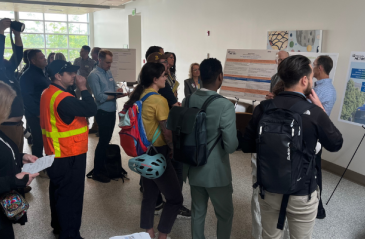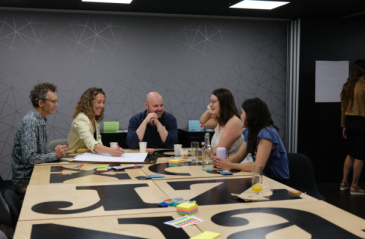
The information barriers holding back climate action and how to break them

Holland's first government design lab is seeking to transform policymaking from within
Share articleThe RVO Accelerator maps a policy or programme from initial idea to project
Share articleX Lab is approaching the end of its inaugural year and is now rolling out its services
Share articleWe put our vision for government into practice through learning partner projects that align with our values and help reimagine government so that it works for everyone.
It's perhaps apt that the Netherlands' first government design lab has found a home at the country's enterprise agency. After all, few know more about the challenges of turning a fresh and innovative idea into reality than entrepreneurs. By bringing new products to market they create jobs, wealth, growth and progress. RVO X Lab is looking to make a similar splash, but in this instance within government rather than the private sector.
Although the unit is young - it is still in its first experimental year - it is already helping reshape ways that policy can be formulated, explains its director, Dounia Ouchene. “Designing new public services is particularly challenging because services are taxpayer-funded and earnings are eventually measured in terms of public trust, like commercial enterprises measure financial profit,” she points out. “But innovation and trying new approaches can really help government find the most effective solution - which is what we're here for.”
Of course, RVO X Lab is by no means the first lab to take firm root in a government. The existence and successes of similar organisations - Denmark's MindLab, the UK Policy Lab and the OPM Lab in the US, to take three examples - are a testament to the challenging and complex nature of modern public services. Focused purely on delivery and innovation, labs aim to create better solutions that benefit entrepreneurs and policymakers alike, and Ouchene freely admits that she and her team have sought inspiration from labs elsewhere.
“We have done extensive research about labs all over the world,” she says, “including speaking with Christian Bason, who previously headed up MindLab, and this type of knowledge sharing is so valuable. We found there were lots of similarities with the Nordics and the UK, in particular, because the political dimensions are very alike and we face similar challenges and contexts. This means we have closely followed their approach and experiences.”
Preparations for the lab began in 2014. “We were looking for examples of unusual practice - specifically, examples of how knowledge adds value to public services,” she explains. “Our aim is that policy can be tested and designed, so a lot of our original thinking was about what a laboratory actually does. We wanted to learn from colleagues in forensic sciences, for example, or meteorologists and engineers.”
Although this doesn't mean that Ouchene and her team can be found donning a white coat when at work, it is clear that this appliance of science holds considerable sway in their approach. “The ‘X' in our name stands for explore, experiment, extend and exchange,” she explains. “We are aiming high and, with a blank page, have been trying to imagine what government will look like for our kids. We truly want ours to be a next generation lab.”
A running thread in X Lab's approach and philosophy is the importance of service design in identifying stronger policies and solutions. “As the implementation agency of the Ministry of Economic Affairs, our challenges often start with helping answer the question ‘Should the government invest in a new public service?',” explains Ouchene.
Addressing this challenge is not easy, she continues, because even the most apparently simple government services can often exhibit huge complexities. “This is why service design capabilities at RVO had to go beyond usual methods of design thinking to include those from systems thinking, economics, and industrial engineering. We share our experience of developing design capabilities at the lab because we believe that service design is a way of prototyping new policies.”
Certainly, this focus on “sharing” is something prioritised by the X Lab team. Not for them a confrontational approach, instead they seek to collaborate and build support - slowly but surely - for the changes they seek. “We use principles like design coding to help policymakers make bolder decisions and be comfortable about making them,” Ouchene explains.
“We want to influence the system from within, so we offer a safe environment for them to work in. We introduce ourselves as a team who can introduce new perspectives - it's how we construct the lab. It's about equipping them with new capabilities and new ways of thinking. We work with small groups - a maximum of five to eight at a time - and although the complexity of a policy challenge is the starting point, we try and reduce it down into smaller issues that are easier to address.”
A good example of their approach to service design is the RVO Accelerator, which is a design tool that maps the journey of a policy or programme from the initial idea in the mind of an entrepreneur or policymaker all the way to a project or programme funded by taxpayer money. “The Accelerator is also a business model template for initialising public service design,” says Ouchene. “Thinking in services helps frame new and interesting policy options that ultimately contribute towards reducing the cost and risks of implementing policy.”
Ouchene is keen to stress, however, that it is still early days. The lab is approaching the end of its inaugural experimentation year and, with several projects under way, the task now is to roll out its services and offerings to benefit its Ministry.
“We are still learning as we go and I can't say for certain if we have the right formula yet,” she concedes. “But we are happy to have this opportunity to experiment and make sure we have an approach for the lab that will maximise its effectiveness in the future. In five years, I hope it is a core part of government and this style of design thinking is just business as usual. Time will tell!”












